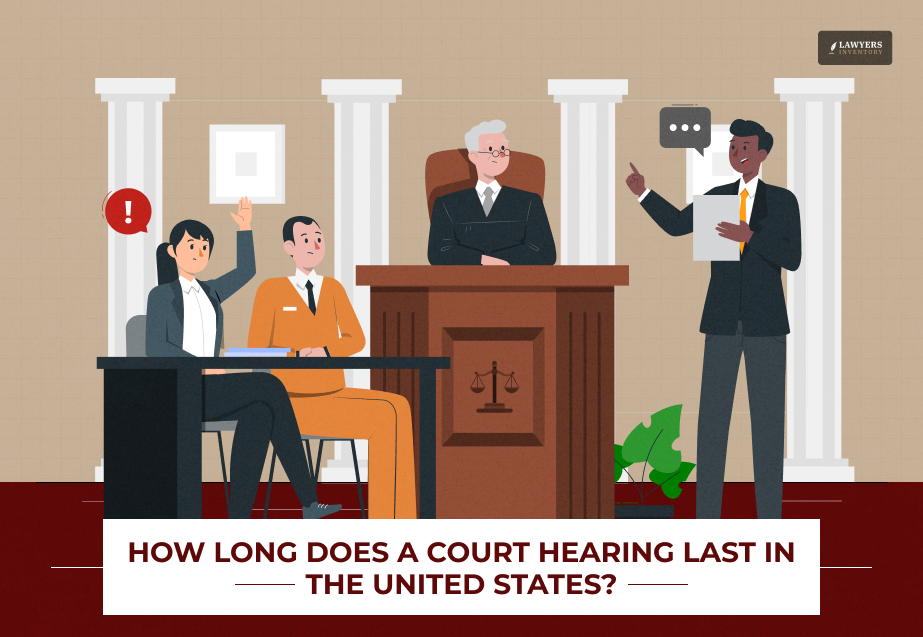
How long does a court hearing last is a common question asked by many people who find themselves involved in a legal matter. Whether you’re a defendant, a plaintiff, or simply a witness, knowing what to expect can ease a lot of stress.
A court hearing is a legal gathering where a judge (and sometimes a jury) is being informed about legal issues to solve them. It may include showing evidence, giving testimonies, or ending the legal disputes.
Whereas some hearings are just several minutes, others use all the time they have, some of them even throughout the day. The precise duration is the total of many factors, such as the degree of complexity of the case, the court’s schedule, and the nature of the hearing.
Hi. In today’s blog, these are some of the things that I will be talking about. Additionally, I will explain what typically happens during a court hearing, how long it usually takes, and what can affect the timing.
So, if that is what you want to know, keep on reading this blog till the end and thank me later…
What Happens in a Court Hearing?
At a court hearing, a judge decides the outcome of the legal issue by listening to the arguments of both sides and by assessing the law and the evidence.
The majority of hearings are performed that way, where the two involved parties, being either individuals or representatives, have the chance to air their opinions.
After having finished speaking, they could still use facts, documents, or witnesses as a basis to back their statements.
Some hearings may be as basic as just reviewing some files or asking a few questions and nothing else, yet some may require thorough evidence evaluations, witness interrogations, and argumentations.
In case of criminal proceedings, the hearing could be asking questions to the relevant authorities, the evidence available, or the charges. In civil matters, it may concern money, contracts, or property.
The judge listens carefully, follows the proceedings and might ask questions to get the matters clear.
After everything has been explained, the judge can decide right away or take some time to make the decision. Not every hearing leads to a final decision — some are only one step of several in a court case.
How Long Does a Court Hearing Last?
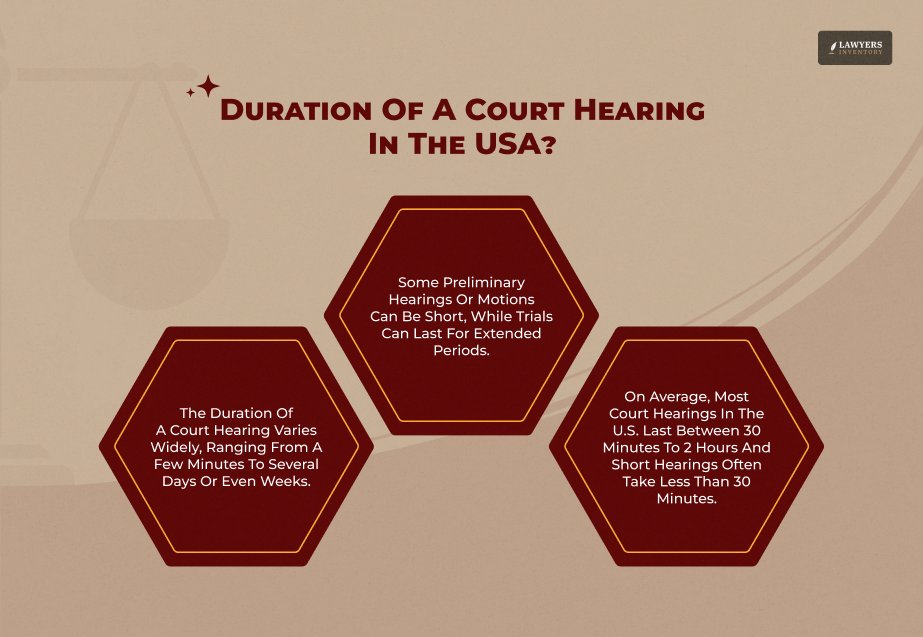
The duration of a court hearing can vary widely. Some last only 10 to 15 minutes, while others take hours or even several days.
There’s no fixed rule for how long a court hearing will be—it depends on the type and complexity of the case.
What is the Average Duration of Court Hearing?
On average, most court hearings in the U.S. last between 30 minutes to 2 hours. Short hearings like arraignments or status conferences often take less than 30 minutes. These are routine matters that don’t involve deep legal arguments or evidence.
However, longer hearings, such as preliminary hearings in criminal cases or motion hearings in civil cases, can stretch from 1 to 3 hours. If a hearing includes witness testimony or complex arguments, it might last the entire day or even carry over to another day.
Trial hearings are different. They can last for several days or even weeks, depending on how many witnesses are involved and how much evidence needs to be reviewed.
For example, a murder trial or a large business dispute can last weeks. But for most everyday legal matters, you can expect the hearing to be over in a couple of hours.
What Time Does the Court Start and End?
Most courts in the United States follow a standard schedule, usually beginning the day around 8:30 AM to 9:00 AM.
The court may run until about 4:30 PM or 5:00 PM, with a break for lunch around noon, typically from 12:00 PM to 1:00 PM.
Some courts may schedule multiple hearings in one day, so even if your case is listed for a morning session, it may not be called right at 9:00 AM.
You may have to wait for other cases to finish. Similarly, if your hearing is in the afternoon, be prepared for delays from earlier sessions.
Courts usually don’t operate on weekends or public holidays unless it’s an emergency or special court (like night court in some large cities).
It’s always best to arrive early and be prepared for some waiting time. Judges, clerks, and lawyers all work on tight schedules, and delays are common.
Factors Affecting Duration of a Court Hearing
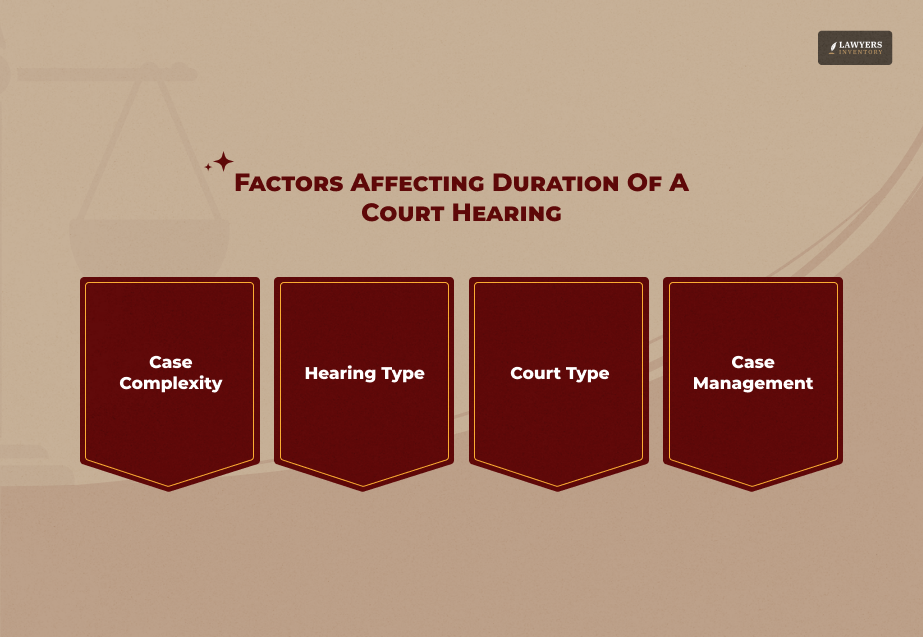
Several factors can influence how long your court hearing will last. It’s not just about the time on the clock—it’s also about what needs to be covered in the hearing.
Complexity of the Case
The more complicated the legal issue, the longer the court hearing will take. For example, a hearing about unpaid rent is usually straightforward.
But a hearing involving multiple parties, disputed contracts, or serious criminal charges will need more time.
Complex cases require reviewing many documents, listening to expert witnesses, and detailed arguments from lawyers.
This can easily stretch the hearing into several hours or even multiple days. If both sides have strong, opposing arguments, it may take longer for the judge to sort through the facts and apply the law correctly.
Type of Hearing
Every court hearing does not have the same format, and the hearing type that you are having will be one of the factors that will determine how much time it will consume.
Here are a few types that are common:
- Arraignment: In general a short process, wherein the accused is informed of the charges and asked to enter a plea. Mostly, it will last 10 to 15 minutes.
- Preliminary Hearing: It is the platform the court uses to decide if the case is worth being tried after ascertaining that there is enough evidence against the accused. The duration depends on the case. It can also take some time to be concluded.
- Motion Hearing: These hearings are usually for legal issues, such as whether the court can permit or prohibit a particular piece of evidence. They usually take no more than an hour.
- Trial Hearings: These proceedings are the most elaborate and also longest as both parties tell the court the full story of their case. Trials can go on for many hours and even several days.
Each type of hearing has its unique organization, and the time required to conduct the session depends on the purpose to be served in that session.
Type of Court
There are several types of courts with various procedures, which might reverse the course of a hearing, causing it to last to a much greater extent. Below are the instances:
- Small Claims Court: These hearings usually move very fast, sometimes not exceeding an hour. The process is straightforward and done for the majority of the cases.
- Family Court: Disputes on child support, visitation, separation or any form of disagreement involving parents may be the cases referred to as family court. These cases will definitely take longer, especially if both parents are not in agreement. This can go on from 30 minutes to several hours.
- Criminal Court: A criminal case can continue through various stages, from the initial arraignment and bail hearings to the actual trial. Some are resolved quickly. However, the most serious ones can drag on for a longer period.
- Civil Court: These handles disputes and cases of agreement breaches, ownership, or injury. Here, how long hearings last depends on the number of issues.
Moreover, the federal government may have different rules from the states, and this can also determine the length of a trial.
Read Also:
- Key Benefits of Settling a Personal Injury Case Out of Court
- Can You Get the Guardianship of a Child Without Going to Court?
- How to Become a Supreme Court Lawyer in LESS Time and Money?









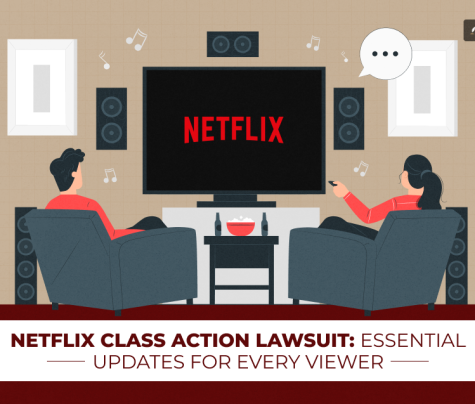
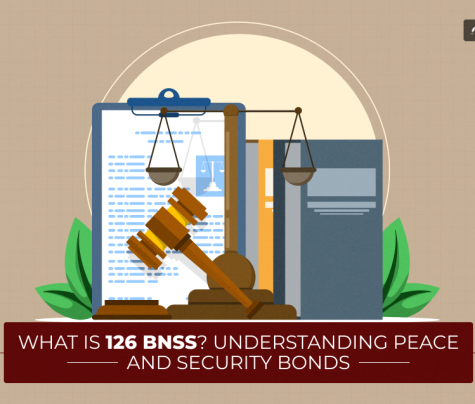
0 Reply
No comments yet.